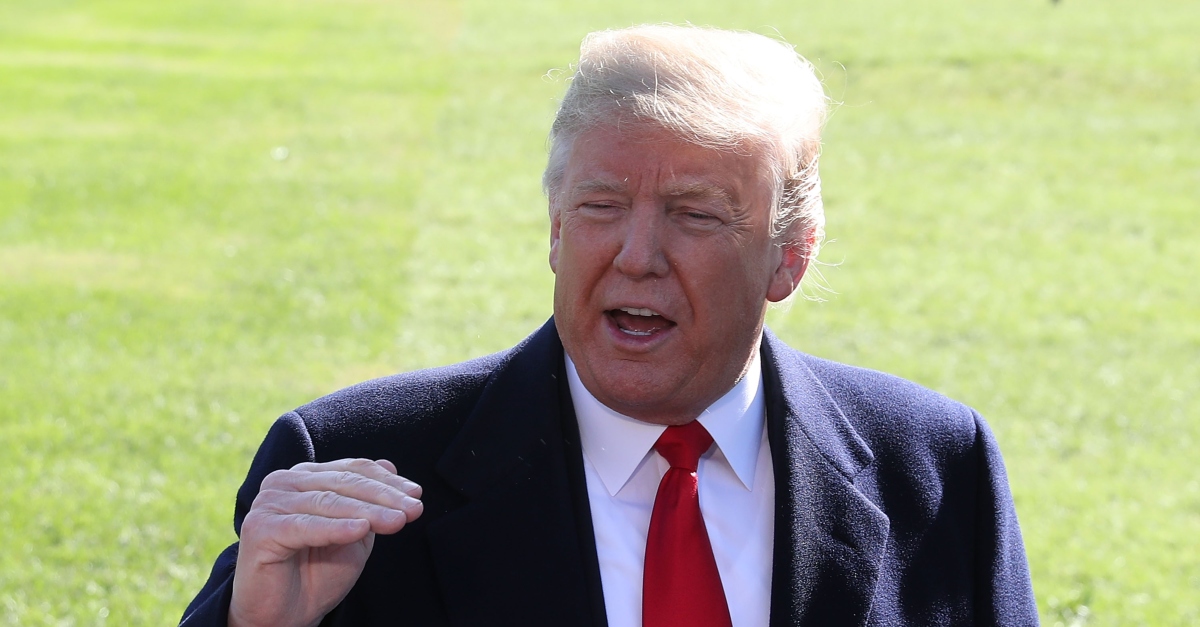
Based on what we saw in court last week, it seemed likely that a federal judge would rule against President Donald Trump’s challenge of House Democrats’ subpoena of finance firm Mazars USA. U.S. District Judge Amit Mehta confirmed those suspicions on Monday, ruling in favor of Congress and denying a stay pending appeal.
Mehta, an appointee of former President Barack Obama, began by pointing out that President Trump’s argument was the one James Buchanan posed “[s]ome 160 years” ago. Judge Mehta concluded that, based on the result of that centuries-old fight, Trump “cannot block the subpoena to Mazars.”
“Echoing the protests of President Buchanan, President Trump and his associated entities are before this court, claiming that the Oversight Committee’s subpoena to Mazars exceeds the Committee’s constitutional power to conduct investigations,” Mehta said, clarifying the issues at hand. “The President argues that there is no legislative purpose for the subpoena. The Oversight Committee’s true motive, the President insists, is to collect personal information about him solely for political advantage. He asks the court to declare the Mazars subpoena invalid and unenforceable.”
Mehta said that “Courts have grappled for more than a century with the question of the scope of Congress’s investigative power,” but that the “binding principle that emerges from these judicial decisions is that courts must presume Congress is acting in furtherance of its constitutional responsibility to legislate and must defer to congressional judgments about what Congress needs to carry out that purpose.”
While acknowledging that there are “limits on Congress’s investigative authority,” Mehta said that those limits “do not substantially constrain Congress.”
“So long as Congress investigates on a subject matter on which ‘legislation could be had,’ Congress acts as contemplated by Article I of the Constitution,” he continued. “Applying those principles here compels the conclusion that President Trump cannot block the subpoena to Mazars.”
The judge noted that the House Oversight Committee claims that it needs Trump’s financial records to “aid its consideration of strengthening ethics and disclosure laws, as well as amending the penalties for violating such laws,” and “assist in monitoring the President’s compliance with the Foreign Emoluments Clauses.”
There was also this:
Mehta determined that these were all “facially valid legislative purposes,” and said that it was not his place to question Congress’ motives. Thus, he entered an order “in favor of the House Oversight Committee” and denied the request for a stay pending appeal.
You can expect Trump’s lawyers to appeal. If and when that happens, we’ll need to see if the appellate court agrees that there should be no stay and that the subpoena case can be fast-tracked as Judge Mehta desires.
Mehta did set the tone last time he spoke on this matter. “No judge would make a hasty decision on such important issues for the sake of expediency,” he said on May 14. Mehta also said, though, “We’re not dragging this out.”
Mehta’s grilling of Trump attorneys suggested that he would rule in favor of the House Oversight Committee.
“Say for example if a president had a financial interest in a particular piece of legislation that was being considered […] in your view Congress could not investigate whether a president has a conflict of interest?” the judge asked.
“It would lack legitimate legislative purpose,” Trump attorney William Consovoy answered.
Mehta also asked if it was correct that there hasn’t been a case since 1880 in Kilbourn v. Thompson in which Congress was found to have issued an unlawful subpoena. Consovoy acknowledged that the judge was right.
Mehta mentioned in one exchange that the lack of definition of Democrats investigation “really does open the door” to allegations that this is “political,” whether that is “valid or not.”
At the same time, Mehta pointed out that he “can’t look to Congress’ motives.” The judge repeated that today.
The House Oversight Committee previously subpoenaed Mazars USA for Trump’s financial documents, including “Statements of Financial Condition.” During a recent congressional hearing, former Trump lawyer Michael Cohen stated that Trump would use these statements to exaggerate the value of his assets. He would allegedly due so by inflating the number of residential units in properties and the number of floors in towers he owned. Democrats are looking into this to see if any of these alleged misrepresentations were criminal in nature. Trump had previously put Mazars USA “on notice,” saying that legal action could come if they complied with a subpoena.
Trump has alleged that the subpoena was issued “with the hope that it will turn up something that Democrats can use as a political tool against the President now and in the 2020 election.” Trump lawyers called the subpoena a “weapon of choice” for House Democrats in their “all-out political war against President Donald J. Trump.”
Read Judge Mehta’s opinion in full below.
Judge Mehta Rejects Trump Argument by Law&Crime on Scribd
[Image via [Images via Mark Wilson/Getty Images]